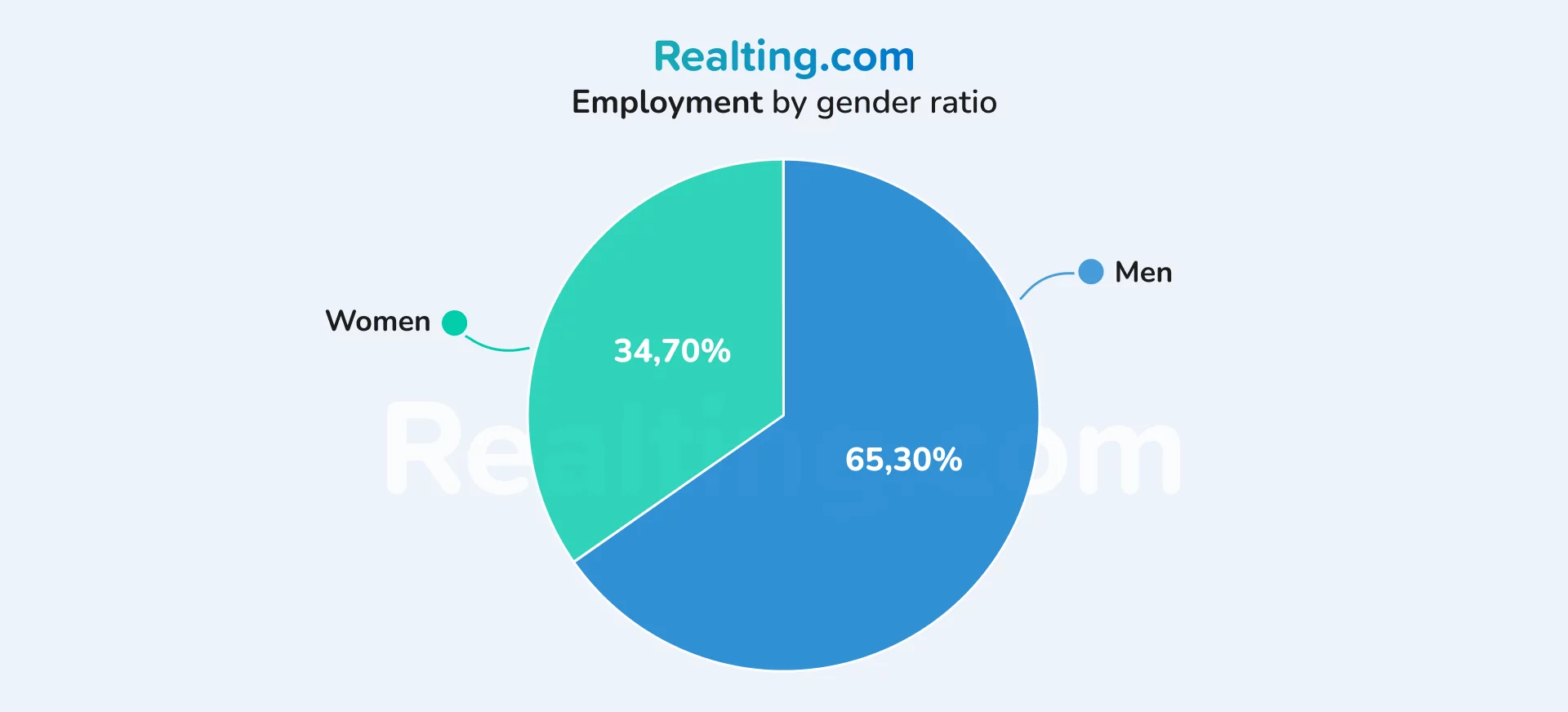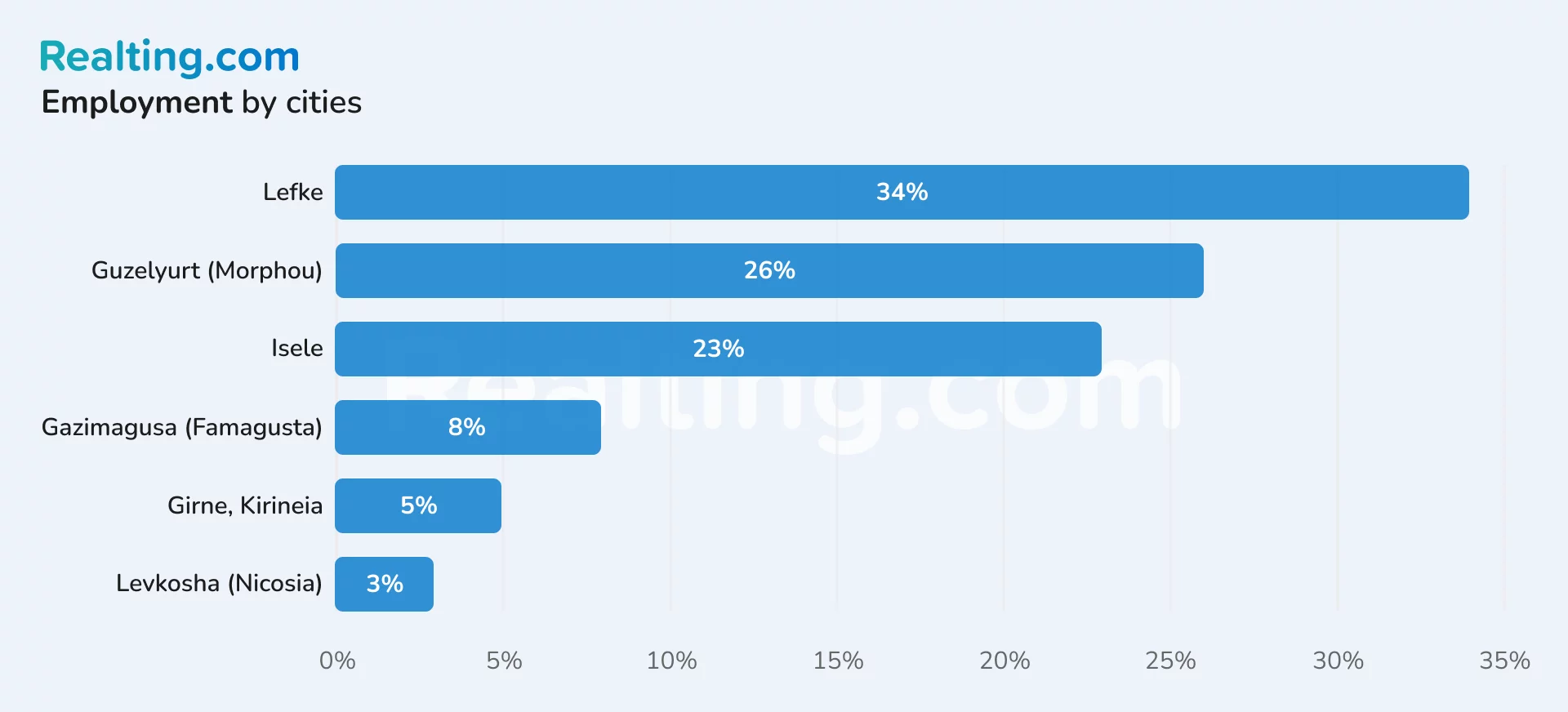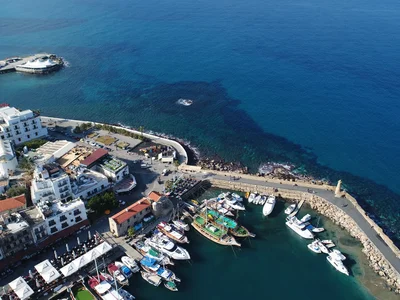
How to Find a Job in North Cyprus
In recent years, Northern Cyprus has become an increasingly attractive place to work and live. Amid recent reports of huge inflation in the country, analysts predict the stabilization of the economic environment from the influx of foreign investment.
The government began developing the tourism and gambling industries, as well as investing in real estate construction and the development of related infrastructure. This has created a demand for a wide range of job opportunities, which we will discuss in detail in our article. We will also look at how to find work in this part of the island.
Work Features in North Cyprus
Due to Northern Cyprus's complex legal status, it isn't easy to find a job remotely. Expats can find only a few real jobs in TRNC on the Internet. So, it is best to look locally or through acquaintances.
Some agencies offer to buy property to obtain a residence permit, implying that it will allow working in the TRNC. It is indeed possible to get a residence permit in this way, but not to work. A work visa is required for legal work.
Employers are not always ready to deal with bureaucratic procedures. Therefore, they offer to issue a work visa after the start of work or after arrival. But they do not always fulfill this promise.
Northern Cyprus has underdeveloped manufacturing and agriculture. The country's main income sources are tourism and the service sector. Moreover, the construction sector is developing due to significant investments in the industry despite international sanctions. Numerous educational institutions create teaching jobs in North Cyprus. However, in education, the requirements for knowledge of the Turkish language are stricter than in other sectors.
Turkish is the state language and greatly facilitates employment and daily life. English is common in the tourist and educational spheres, and in a few international companies, it can be one of the working languages.
Job Opportunities In North Cyprus
Tourism is the most promising area of Northern Cyprus. The authorities are starting to develop the tourist destination by renovating existing properties. The best example is the restoration of Varosha and the opening of its beaches to tourists.
For reference: Varosha was the largest resort town in Cyprus before the partition of Cyprus. It attracted the celebrities of the period and was developed with luxury hotels. However, Varosha became a ghost town for the next 48 years after the partition, with limited visitor opportunities.
The government of Northern Cyprus is actively developing the country's gambling business. About 20 large casinos create many jobs in North Cyprus for foreigners. Employers provide employees with several bonuses, including housing, uniforms, etc.
The next promising area is real estate construction. Tourism attracts investments in the construction of real estate and infrastructure, and in the case of Varosha, in the renovation of existing structures. Therefore, workers and construction specialties are growing in Northern Cyprus' labor market.
In-demand specialties in North Cyprus:
- hotel managers;
- tour guides;
- maids;
- waiters;
- sales consultants;
- bartenders;
- administrators;
- teachers;
- professors;
- administrative staff;
- construction workers;
- bricklayers;
- carpenters;
- electricians;
- plumbers;
- doctors;
- nurses;
- therapists;
- pharmacists;
- software developers;
- system administrators.
Specialists with high qualifications are in demand. In medicine, these are dentists, surgeons, diagnostic specialists, and specialists in developing and producing medicines. In construction, these are engineers and architects. In education, these are specialists with high degrees, researchers, and senior academics.
Highly specialized employees are also required in the financial and legal sectors, and there is a shortage of analysts, accountants, international and corporate law specialists, managers, and senior executives.
You can get hotel or casino jobs in North Cyprus without special knowledge. There are vacancies for laundry staff, hotel room attendants, and others. You can also find vacancies for warehouse workers, loaders, packers, and sorters. Construction can only offer vacancies for laborers, as other positions require specialized secondary education with a specific specialization. Restaurant jobs in North Cyprus are also available for people without additional knowledge. Kitchen staff vacancies mostly represent them.
How to Get a Job in Cyprus
It is better to start looking for job opportunities in North Cyprus through local contacts, job fairs, or by contacting the employer directly. The remote job search system is poorly developed, and only a small proportion of available vacancies are posted on websites.
In cases of readiness to accept a new employee, the employer checks whether the quotas for hiring foreign employees in his field of activity are not exceeded. If all is well, the employer draws up an employment contract. The employer may ask the potential employee for other documents, including a valid passport, proof of qualifications, and health insurance. In some cases, a criminal record certificate or proof of residence in North Cyprus may be required.
The employer goes to the Ministry of Labor and Social Security and prepares an application for a work permit. At the same time, the employer must prove that there are no specialists for this position in the local labor market. The Ministry publishes the vacancy on internal resources, and if no local people respond to it within two weeks, the employee is granted a work permit.
An official invitation from the employer is the basis for applying for a work visa at the Turkish or Northern Cyprus Consulate in the country of residence. It is necessary to submit the invitation from the employer and other required documents (passport, photos, health insurance, etc.).
The last step is to finalize your North Cyprus work visa and work permit upon arrival, register with the local authorities, and obtain a residence permit. However, the conditions of entry to North Cyprus have their specifics.
There are two ways to enter Northern Cyprus. The first is through the southern part of the island, but it will be necessary to issue a tourist or Schengen visa. Upon arrival, you can go to Nicosia to one of the checkpoints, where a foreigner will be issued a 90-day tourist North Cyprus visa.
The second way is to travel to Cyprus via Turkey. This can be done by airplane or ferry. The only official air flight to this country is from the main airports in Turkey to Ercan Airport in Northern Cyprus.
Ferries depart from the Turkish coast and allow the transfer of luggage and vehicles. The official authorities of the Republic of Cyprus consider entry through northern airports and ports illegal, although, in practice, this rarely causes problems.
Requirements and Regulations
Apart from appropriate qualifications, the main and most important requirement is language skills. As Northern Cyprus is economically and politically dependent on Turkey, the position of this language is much stronger than that of English. Even in service areas directly related to foreigners, such as tourism, gambling establishments, and others, a basic knowledge of Turkish is often required, mainly for everyday life and communication with Turkish Cypriots. This is why a good knowledge of Turkish opens up more jobs in Northern Cyprus than a good knowledge of English.
An important element of preparing documents for work or study is their nostrification. The Ministry of Education of the TRNC must nostrificate foreign diplomas. This process confirms that foreign diplomas meet local educational standards. For nostrification, original educational documents translated into Turkish or English and their certified copies must be submitted.
Northern Cyprus visa requirements:
- At least 18 years old.
- Documents confirming qualification and passing professional examinations (for doctors, lawyers, and others).
- Knowledge of the history and culture of Cyprus for positions related to educational and cultural activities.
- Medical examination to confirm the absence of serious and chronic diseases.
- Clear criminal records.
- Proof of sufficient financial means to stay in the country and return home.
- Proof of hotel reservation or accommodation (receipts, rental agreement, etc.).
Wages in North Cyprus
Before discussing the salary in North Cyprus, it is necessary to discuss the inflation rate. The Statistical Institute of Northern Cyprus reported that in March, the inflation rate increased by 6.9% compared to the previous month. By the end of 2023, it had already increased by 16.1%. The annual inflation rate reached 94.5%.
On May 1, 2024, the government made another adjustment to the minimum wage in Тorth Сyprus, setting it at 29,640 Turkish Liras (about $920) net and 34,070 Turkish Liras (about $1060) gross. This is the second increase in the minimum wage this year, following the initial rise in January to 24,000 Turkish Liras net. It's important to note that in January 2023, the minimum wage was a mere 11,800 Turkish Liras net per month, less than half of its current level. These frequent changes in the minimum wage are a direct response to the high inflation rate in the country, reflecting the volatility in the labor market.
The Statistical Institute of Northern Cyprus may not provide real-time data on salaries, but it does offer valuable insights into the structure of the labor market. The most recent labor market survey was conducted in 2023, and while this might seem outdated, it's important to note that the socio-demographic situation in Northern Cyprus has remained relatively stable since then. Therefore, the data from the 2023 survey can still be considered relevant and provide a current understanding of the labor market.
Most people in the country work in services (76%), construction (11.5%), industry (9.5%), or agriculture (3%).
Employment by sector:

Employment by gender ratio:

Employment by cities:

Average salaries in North Cyprus:
|
Public sector |
|
|
Manager |
$1890 |
|
Civil servant with higher education |
$1320 |
|
Civil servant without higher education |
$1130 |
|
Office Staff |
|
|
Office Manager |
from $2870 |
|
Auditor |
$2700 |
|
Administrator |
$2320 |
|
Office Assistant |
from $620 |
|
Health care |
|
|
Doctor with specialization |
$2520 |
|
General practitioner |
$2170 |
|
Nurse |
$1390 |
|
Pharmacist |
$1160 |
|
Service sector |
|
|
Hotel manager |
$3100 |
|
Administrator |
$1090 |
|
Bartender |
$1390 |
|
Waiter |
$930 |
|
Janitor |
from $580 |
|
Chef |
$2170 |
|
Deliverers |
from $780 |
|
Transportation |
|
|
Public transportation driver |
$1940 |
|
Cab driver |
$1470 |
|
Manufacturing |
|
|
Manager |
$2480 |
|
Operator |
$1010 |
|
Worker |
from $700 |
|
Education |
|
|
Teacher |
$1390 |
Jobs for expats in Northern Cyprus may pay below the average market wage. However, the exact difference is highly dependent on your Turkish language skills.
Taxes in TRNC
Taxes in North Cyprus are quite democratic and do not involve large deductions. Income tax is quite flexible and ranges from 10 to 40%. The progressive taxation system implies an increase in the tax burden depending on annual income. And given that the average salary in Northern Cyprus is around 27,000 Turkish Liras (TRY), taxes for most workers are quite forgiving.
Taxation intervals as of January 1, 2024:
|
Interval in Turkish Lira (TRY) |
VAT rate |
|
up to 30,000 |
10% |
|
30,000–60,000 |
20% |
|
60,000–90,000 |
25% |
|
90,000–210,000 |
30% |
|
210,000–420,000 |
35% |
|
over 420,000 |
40% |
The standard corporate tax rate is 20%. It applies to the profits of all companies registered in the TRNC, including foreign corporations. A discount of up to 10% is provided for enterprise, educational, and healthcare companies in North Cyprus. Income from international projects financed by foreign countries or international organizations is exempt from taxation if the conditions of financing and project use are met.
VAT
Unlike most countries, the value-added tax in Northern Cyprus is not uniform. It comprises five rates, ranging from 0 to 20%, and varies according to the good or service.
VAT rates as of April 2024:
|
VAT rate |
Goods and services |
|
0% |
Staple foods such as milk, bread, and wheat products. Educational materials and some medical supplies. |
|
5% |
Dairy products, some agricultural products, and medical equipment. Basic household items such as some soaps and detergents. |
|
10% |
Prepared foods such as pizza and bakery products. Household appliances and building materials. |
|
16% |
Standard rate VAT applies to goods and services of general consumption and real estate transactions. |
|
20% |
Luxury goods such as alcoholic beverages and tobacco products. High-end cars and certain entertainment services. |
Businesses must register as VAT payers if their annual turnover exceeds 100,000 Turkish Liras.
Consequences of Illegal Employment
The main consequence for an illegal worker is deportation. This primarily applies to workers who entered the country without proper documentation and those who have overstayed or violated the terms of their work permit. Students who work without the necessary permits can also be deported.
In exceptional cases, illegal aliens can legalize their status by paying fines. For example, the immigration amnesty program, which was in effect until January 2023, allowed such workers to pay a fine equal to the minimum monthly wage. After that, they were given a 60-day tourist visa, which could either legalize their stay or leave the country.
Interestingly, the situation is quite different for unscrupulous employers. Instead of facing severe punishment, they often receive a mere warning. In some cases, they may be fined or even face business closure. The lack of strict enforcement and the expenditures of registration can inadvertently encourage employers to hire illegal workers.
Retirement in North Cyprus
The Government of Northern Cyprus does not differentiate recipients of pensions based on their nationality or nation. Therefore, it is sufficient to meet the required criteria. The law does not prohibit pensioners from working and earning a double income, especially when the skill or profession is in demand on the island.
Employees usually contribute about 9% of their salary before taxes. Employers pay 14% of an employee's total salary. The self-employed contribute about 20–23% of their declared income.
General requirements:
- Seniority. The minimum length of service, i.e., the time a person worked and contributed part of their income to the treasury, is 20–25 years. Public sector employees can work for 20 years and then apply for early retirement. People with 14 years of work experience can count on a pension. However, in this case, the pension will be reduced, and the retirement age will be raised to 63.
- Age. Officially, the pension begins at the age of 60. However, if an employee has already completed the required 25 years of service, he or she can apply for early retirement when reaches the age of 55.
Frequently Asked Questions About Finding a Job in North Cyprus
What is a work permit cancellation?
Who pays the work permit fee?
Where can I find a job in North Cyprus?
What kind of jobs can I find in North Cyprus?
Which city is the best for finding a job?
Author
I write informative articles about real estate, investments, job opportunities, taxes, etc.























